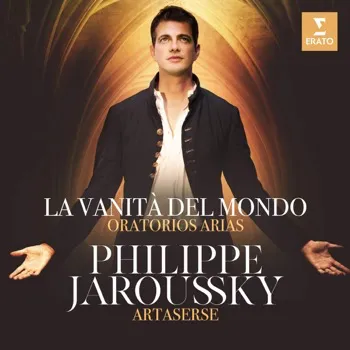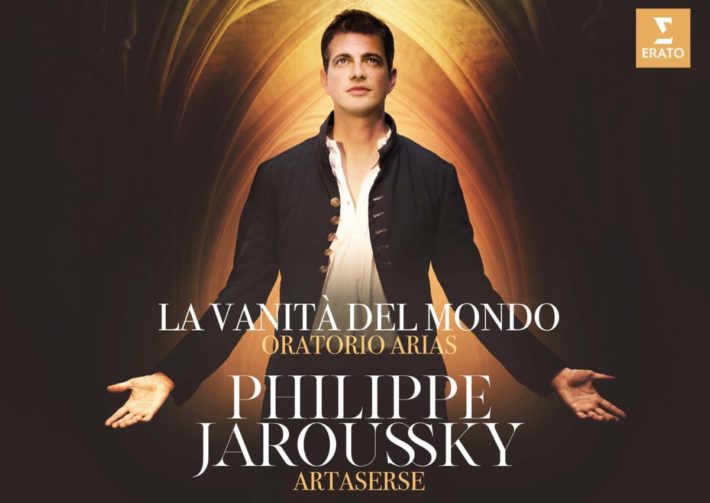The title of Philippe Jaroussky’s latest release, ‘La vanitá del mondo’ (‘The Vanity of the World’), is taken from an oratorio by Pietro Torri (1665-1737). But the album is more considered, calmer and contemplative than his previous recital release — ‘Ombra Mai Fu’ (reviewed here). Sidestepping from the decadent stages of the Baroque opera houses to the church, Jaroussky exchanges the props and scenery for more sacred backdrops.

The programming is interesting, focusing on the Italian oratorio before Handel’s recreation and redefining of it. The extracts are carefully chosen and complement each other, taking the listener on an exciting journey of discovery – Including seven premieres. The thoughtful selections ensure variety, revealing Jaroussky’s persuasive skills at taking on the different characteristics of multiple personalities. While the range of roles is varied, there is a consistency of approach going through the entire album.
In the opening “Perché più franco” from ‘Abramo’ by Torri, the first of the premieres, Jaroussky portrays Isaac, looking to God for answers, doing so with distinguishable and modest restraint. In the concluding aria, he takes on a completely different role — Mary, Mother of James, in Caldaraq’s Morte e sepoltura di Christo — a part written for the castrato Carestini. Here Jaroussky finds pain and anguish in the muted colours with commendable refinement. Turning to the role of a Maidservant in Alessandro Scarlatti’s ‘La Giuditta’ (based around the Old Testament character of Judith), Jaroussky is once more on a gentle mode, in a highly expressive and tender rendition.
Punctuating the longer, mellifluous, melodic lines of the reflective arias are pieces that demand great virtuosity and vocal dexterity. Jaroussky shines in two highly demanding arias, both premier recordings, making them very much his own. He shows great skill when addressing Moses in “Caderà, perirà” from Fortunato Chelleri’s ‘Dio sul Sinai’ (track 5) and as Ioabbe in “Contro l’empio s’impugni la spada”, taken from Caldara’s “Assalonne” (track 7). With such agility, security and assurance, Jaroussky is particularly impressive, his melismatic phrases are articulate, flowing effortlessly and smoothly with enough restraint to fit the music’s sacred context.
The tone of Jaroussky’s voice is consistent across his range. It’s not as bold as Andreas Scholl, as dramatic as Iestyn Davis or as transparent as Robin Blaze. One might say his voice is slightly more androgynous, especially in his higher tessitura. As one has come to expect, diction and intonation are flawless, as exemplified in Caldara’s virtuosic aria “Amar senza penar” from Santa Ferma (track 14).
There is something natural and direct in the way Jaroussky and Ensemble Artaserse work together, sharing the musical vision, treading the same path. The orchestral sound is superb and the continuo beautifully balanced. The ensemble shines on the instrumental track – the ‘sinfonia’ to Antonio Maria Bononcini’s ‘La decollazione di san giovanni battista’ (track 9).
Good recorded sound too. The booklet is well-written, informative, full texts and translations are included. While there is nothing groundbreaking about the program or the style of the performances, the high standards of Jaroussky’s previous albums are maintained, making this an enjoyable and essential listen for vocal Baroque fans.
“La Vanità del Mondo” – Oratorio Arias
Philippe Jaroussky – Countertenor
Yannis François – Bass-Baritone
Artaserse
Erato / Warner Classics, CD 9029517929




















